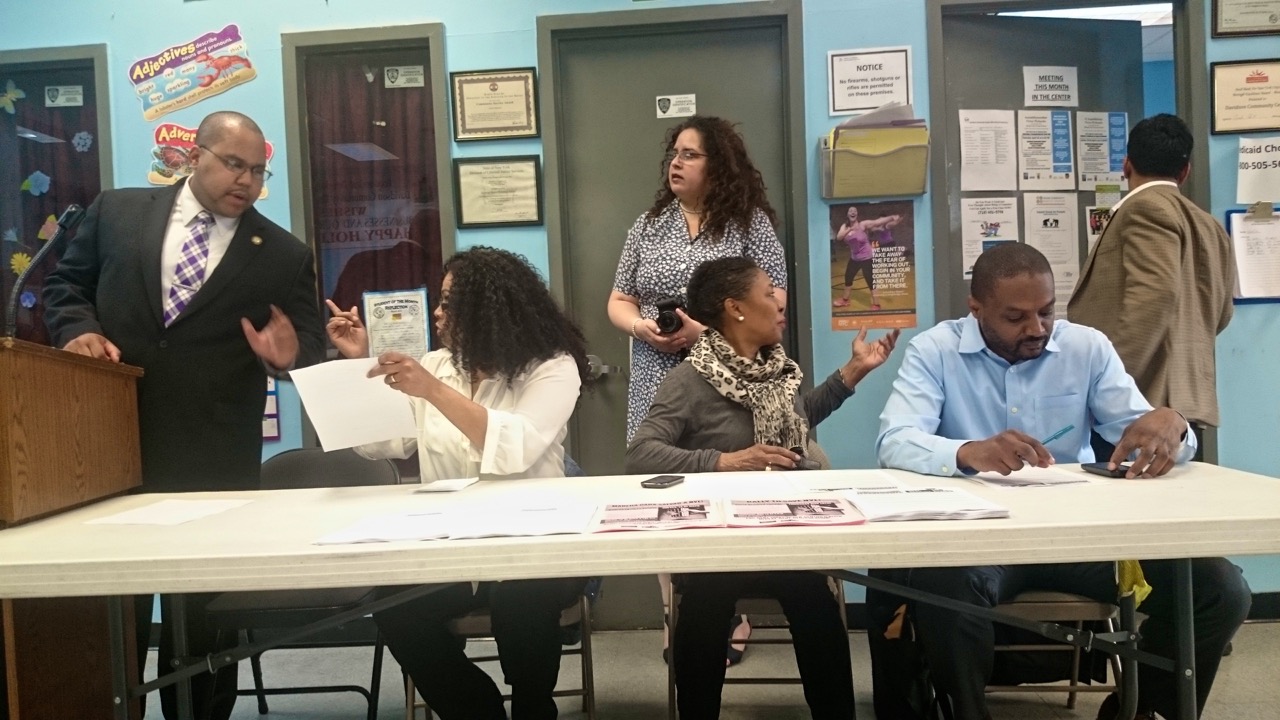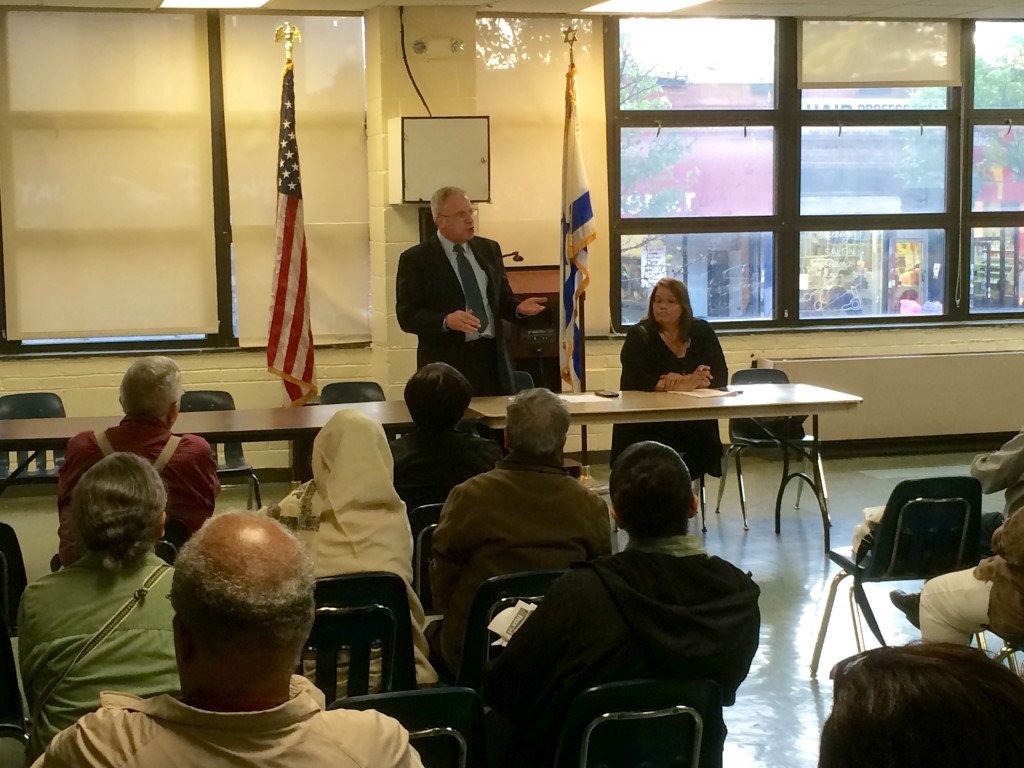
Photo by Moses Bustos
By MOSES BUSTOS and DAVID CRUZ
New York state’s housing laws make affordable apartments available to over a million low-income families by regulating tenant and landlord rights. The rent laws expire June 15, with the Albany Legislature tasked to strengthen, weaken or preserve them in accordance to the needs of tenants and the current housing market.
Recently, tenants and community groups have argued that loopholes in certain laws allow landlords to circumscribe pricing limitations, resulting in what Assemblyman Victor Pichardo of the 86th Assembly District, calls the “blatant harassment” of tenants. If these loopholes are not addressed, many residents may find themselves struggling to pay rent.
Pichardo held a public hearing April 30 at the Davidson Community Center discussing the current rent laws. The meeting was one of several housing forums sponsored by West Bronx Albany Democrats, part of a larger effort to “educate and rally the public” around the fight for stronger rent laws. Pichardo was joined by a panel of housing experts, each from various non-profit groups and grassroots community coalitions who’ve spent the last few months pushing for stronger rent laws.

Learning About the Laws
Under current laws, tenants are susceptible to rent hikes and added building fees thanks to exploited loopholes. Among them is preferential rent, a practice used by landlords to lure prospective tenants into signing leases at seemingly below-market prices, only to increase the rent substantially after the first year. Major Capital Improvements [MCI], building repairs and modifications like elevator repair and general renovations, are another out-of-pocket expense landlords typically pass on to tenants. Vacancy bonuses, a 20 percent rent increase imposed on new tenants of vacated apartments, renter’s fees and source of income discrimination are some other common tactics that have been the norm throughout the Bronx.
Uninformed tenants are forced to either pick up the tab, or pack up and move out. But Pichardo feels residents have another option: they can mobilize. But for tenants to win the battle for rent regulations, Pichardo charges they must

Photo courtesy Office of Assemblyman Jeff Dinowitz
wage a two-front war: one against deregulation, and another against misinformation. Low-income and immigrant families have the most to gain from the protection of rent stabilization, but language barriers and a poor understanding of the law often put them at a disadvantage.
Pichardo’s district, for instance, covers the neighborhoods of Mt. Hope, West Bronx, and University Heights, largely home to black, Hispanic and Latino residents. Many residents at Pichardo’s hearing, for example, were largely unaware of the threats to their rights, and many of the questions raised by guests confirmed suspicions that landlords and building owners are not completely forthcoming on tenant rights.
Legislative Front
Assemblyman Jeff Dinowitz also hosted separate public forums on the issue of rent deregulation recently: one in Kingsbridge and another in Norwood where 50 residents attended. Dinowitz expounded on a bill package that would strengthen protections for tenants who live in rent-regulated apartments, including the right to a lease renewal and the regulation of rent increases for vacated apartments.
Like Pichardo, Dinowitz warned about the dangers posed to tenants should Albany choose to simply reinstate, rather than strengthen, the currently expiring housing laws thanks to a trend in weakening housing legislation that he traced back to 1997. “I went into a little history,” said Dinowitz in a phone interview with the Norwood News. “Eighteen years ago, [Republican] Senator Joe Bruno, then majority leader of the Senate, along with Republican Governor George Pataki, took the position that we’re just gonna let the [housing] laws expire, and if the laws expire, everybody’s apartment will become free-market: no protections, no rights to a lease renewal; it will [all] disappear.”
Dinowitz argues that because “Senate Republicans are very much in the pocket of the real estate industry, they’re anti-tenant,” and this has allowed for “weakening provisions over the years,” which clears landlords to impose big rent increases on vacated apartments, MCI’s, and source/level of income discrimination. Other tactics include surcharges for tenants who install air conditioners, compelling Dinowitz to introduce a bill that would eliminate those surcharges.
Dinowitz and Pichardo, along with other members of the Democratic Assembly, have aimed to increase the thresholds that keep apartments in the affordable housing stock. Rather than “encouraging […] bad landlords to diminish services to push tenants out [and] get a vacancy increase, legislation is being introduced to reduce the vacancy bonus to ten percent.”
Dinowitz condemns raises in rent due to building repairs and renovations that remain permanently fixed to apartments. These rates add to the cost of housing for an increasing number of rapidly destabilizing apartments throughout the city.
“There’s a divide between the Senate Republicans and the Assembly Democrats,” said Dinowitz. “Assembly democrats want to strengthen Tenant Protection Laws […] Senate Republicans, who rely heavily on campaign contributions from the real-estate industry, would be all too happy for the Tenant Protection Laws to go away.”
“As long as the Senate is ruled by the Republican party,” says Dinowitz, “we’re gonna have this horrible battle every year.”
Mobilizing Efforts
It was one reason why “accurate information” was the most important thing residents could take away from Pichardo’s hearing, according to Angel Caballero, one of the administrators of the Davidson Community Center. Communication between landlords and tenants is plagued by differing interests, often exacerbated by no established tenant associations. This is often the case in buildings where immigrant tenants speak little English, are overwhelmed by the legal system and are too timid to file complaints.
Financial woes and limited access to resources make it harder for residents to lobby for reform. Pichardo emphasized that the greatest weapon against marginalization of the working class.
Panelists Yudelka Tapia, 86th Assembly Female District Leader, and Delsenia Glover, President of the Alliance for Tenants Power (AFTP), gave emotional speeches about the importance of unity and solidarity against de-regulation. Robert Decir, a staff attorney representing the Legal Aid Society, listed the housing laws that must be protested to mitigate loopholes made against tenants. Emmanuel Yusuf, representative of Community Action for Safe Apartments (CASA), spoke on behalf of residents who felt alone in their struggle against landlords. He urged tenants to reach out to groups like CASA to learn “how to organize, how to sue, how to call 311.”
Members of the audience needed little motivation to voice their questions and concerns. They were eager to engage with panelists, though the sheer volume of issues brought up only served to highlight the need for more hearings.
At one point, enthusiasm was so high that the spirit of Rosa Parks was invoked to channel the tenacity and determination of her famous civil rights bus protest. “Like Rosa Parks, we’re not moving!” said Glover, referencing the very real threat of eviction many tenants will face should Albany vote against new laws come June. “Are you fired up?!” She asked? The response from the crowd was equally enthusiastic.
“We are tired of not living with dignity, not being treated like humans,” said Tapia. Though she was grateful for the statistics and studies provided in relation to housing, Tapia rejected the notion that tenants needed a reminder of the current threat to their homes.
“We don’t need so many numbers,” she said. “We are living that, every single day.”




